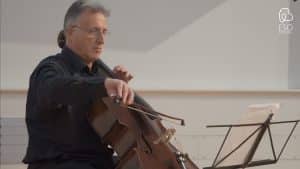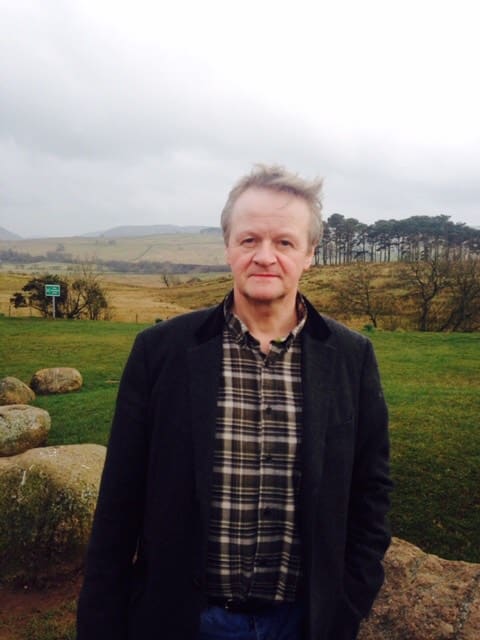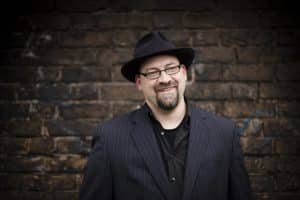Meditations for Armistice Day
Music from Wyastone – Studio Concert Series
Want to view the full video?
You need to be an ESO Digital Supporter to view the full content. Please click here for more information, or sign in to your account below if you’re already registered.
Already a supporter? Click here to log in.
Programme
Adrian Williams Russells’ Elegy 0:09
Elgar arr. Donald Fraser “Nimrod” for Cello and Strings from Enigma Variations 10:25
– Soloist: Raphael Wallfisch (Cello)
Artists
English Symphony Orchestra
Conductor: Kenneth Woods
Soloist: Raphael Wallfisch (Cello)
About this Concert
As we do each year, we take a moment to remember the fallen and to commemorate their sacrifice. Adrian Williams’ short work, Russells’ Elegy, is a deeply touching meditation of friendship and loss, emerging from and retreating to silence. Edward Elgar’s Nimrod has long had special poignancy at this time of year, and is heard in a powerful new arrangement for solo cello and strings by the great Elgarian, Donald Fraser.
Discover More
About the Soloist - Raphael Wallfisch

Raphael Wallfisch
At an early age, Raphael was greatly inspired by hearing Zara Nelsova play, and, guided by a succession of fine teachers including Amaryllis Fleming, Amadeo Baldovino and Derek Simpson, it became apparent that the cello was to be his life’s work. While studying with the great Russian cellist Gregor Piatigorsky in California, he was chosen to perform chamber music with Jascha Heifetz in the informal recitals that Piatigorsky held at his home.
At the age of twenty-four he won the Gaspar Cassadó International Cello Competition in Florence. Since then he has enjoyed a world-wide career playing with such orchestras as the London Symphony, London Philharmonic, Philharmonia, BBC Symphony, English Chamber Orchestra, Hallé, City of Birmingham Symphony, Leipzig Gewandhaus, Berlin Symphony, Westdeutscher Rundfunk, Los Angeles Philharmonic, Indianapolis Symphony, Warsaw Philharmonic, Czech Philharmonic and many others.
He is regularly invited to play at major festivals such as the BBC Proms, Edinburgh, Aldeburgh, Spoleto, Prades, Oslo and Schleswig Holstein. He is also frequently invited to be a jury member of international competitions such as the Rostropovich International Competition in Paris, the Schoenfeld in China and the Enescu in Romania.
Teaching is one of Raphael’s passions. He is in demand as a teacher all over the world and holds the position of professor of cello in Switzerland at the Zürich Hochschule der Kunst.
Raphael has recorded nearly every major work for his instrument. His extensive discography on EMI, Chandos, Black Box, ASV, Naxos and Nimbus explores both the mainstream concerto repertoire and countless lesser-known works by Dohnanyi, Respighi, Barber, Hindemith and Martinu, as well as Richard Strauss, Dvorak, Kabalevsky and Khachaturian. He has recorded a wide range of British cello concertos, including works by MacMillan, Finzi, Delius, Bax, Bliss, Britten, Moeran and Kenneth Leighton. For the Chandos Walton Edition he was privileged to record the composer’s Cello Concerto, originally written for his master, Piatigorsky.
Britain’s leading composers have worked closely with Raphael, many having written works especially for him. These include Sir Peter Maxwell Davies, Kenneth Leighton, James MacMillan, John Metcalf, Paul Patterson, Robert Simpson, Robert Saxton, Roger Smalley, Giles Swayne, John Tavener and Adrian Williams.
Alongside his solo career, Raphael has a long-standing and distinguished duo with pianist John York. With a rich history of many international recital tours and numerous recordings, the duo celebrated its 35th anniversary in 2017 and look forward to future collaboration in 2018. Raphael also greatly enjoys touring with his very successful piano trio – Trio Shaham Erez Wallfisch – which he and his colleagues Hagai Shaham (violin) and Arnon Erez (piano) founded in 2009. Four recordings have been released so far, each receiving the highest critical acclaim.
Raphael plays a 1760 Gennaro Gagliano, the 1733 Montagnana “Ex-Romberg” and an exquisite modern cello built for Raphael by Patrick Robin.
He lives in London with his wife, the violinist Elizabeth, and has three children, Benjamin, Simon, and Joanna.
About the Music - Russell's Elegy
This short elegiac piece was adapted in 2011 from the slow movement of my fourth string quartet (2009) in memory of two people who meant a lot to me who shared the same surname.
The idea for it came to me following the death of the great film director Ken Russell (1927-2011) with whom I had the privilege of working briefly in the 1990’s. We shared the same love of late romantic British music and wild places.
The other, John Russell (1916-1990), conductor, pianist and one-time close friend of Gerald Finzi, was one of my teachers at the Royal College of Music who became a mentor and father-figure in the 1970’s and 80’s.
For me both had their roots in a past time and its great composers, a time I never knew yet for which I still feel a deep nostalgia.
Adrian Williams
About the Music - "Nimrod" from Enigma Variations
On October the Third, 1967 I attended an orchestral concert at London’s Royal Festival Hall. The conductor, Sir Colin Davis took the podium and announced that Sir Malcolm Sargent had died earlier that day. He asked that we all stand and have two minutes of silence out of respect for the icon that Sargent had become to us all, especially the Promenaders amongst us.
We remained standing as the orchestra played Nimrod from the Enigma Variations. While I felt a sense of loss it somehow made one feel a warmth and connection to Sargent and all that he had meant to music lovers, as if he was a friend to us all.
Perhaps that is what makes Nimrod such a touching and appropriate piece of music to be played at times of remembrance. It was, after all written as a token of friendship between Elgar and his friend and publisher Augustus Jeager.
As I spent my own two minutes of silence this eleventh hour I reflected on my own family. My grandfather who fought in the First World War and my mother and father in the Second.
The reasons for sacrifice are myriad but we must also reflect on the horrors of the extermination camps of Nazi Germany. The cellist Anita Lasker-Wallfisch survived those horrors and it is so fitting that her son, Raphael should be playing this arrangement in remembrance of all those who lost have their lives in times of war and conflict.
Donald Fraser
About the Composer - Adrian Williams (2019-20 John McCabe Composer-in-Association)

Composer Adrian Williams
Hailed by former ESO Principal Guest Conductor Yehudi Menuhin as “a master of intricate patterns and forms,” Adrian Williams was born in 1956 and showed precocious talent at the piano from the age of four when he began spontaneously improvising. Lessons began at 5 but he only showed improvement with reading music at around the age of ten, when he began to experiment with composition. His first performed piece was a G minor piano trio and a carol, both written when he was 12 and performed at his school. He developed quickly in both piano and composition through his teens and at 13 began composition consultations in London with Lennox Berkeley. A large scale work for three choirs and ensemble ‘The Bridge’ was performed at the Royal Academy of Music as part of the RAM’s 150th anniversary celebrations in 1972. In 1974 he became a double scholar at the Royal College of Music where he won awards for both piano and composition, in 1976 the director of the RCM Sir David Willcocks conducting his ‘Symphonic Studies’ with the RCM orchestra. A Leverhulme scholarship enabled him to continue at the RCM until 1978, the year he won the international Menuhin Prize for composers.
At around this time he began working with the arranger Peter Knight, and through this learned much about the pop world including pop scoring for tv shows. These skills equipped him well in future years when scoring for TV and film.
Also significant are his connections with Holland and Poland. Over several decades he has fulfilled many works and arrangements for the Amsterdam Sinfonietta and its charismatic leader Candida Thompson, including Migrations for 22 solo strings dating from 1998 and a new Concerto for Strings in one movement, jointly commissioned with the Presteigne Festival. Among his arrangements for the Amsterdam Sinfonietta are versions for string orchestra and baritone of Beethoven’s An die ferne Geliebt and Butterworth’s A Shropshire Lad made for the great American baritone Thomas Hampson.
For the past three years Adrian has lived and worked on the borders of Wales close to Hergest Ridge which he considers a perfect creative environment.
www.adrianwilliamsmusic.com
Further Listening - Our Armistice Day Spotify Playlist
Further Reading - Kenneth Woods on creating moments of connection and community
A NOTE FROM KEN WOODS

Conductor Kenneth Woods
We’re now about two months into our series of Music from Wyastone virtual concerts. It has been so exciting to begin to reconnect with you all after so many months of silence.
However big your screen, however fantastic your stereo, we know that a virtual concert will never be the same as a real concert. With that in mind, we’re not trying to re-create a typical orchestra programme in our Music from Wyastone series. One thing you won’t be seeing much of in our series is an evening of well-known works including an overture, concerto and a symphony with a 15-minute intermission. We’re saving those for when we see you person.
Some concerts will focus on a single work, like the Four Last Songs of Richard Strauss which was our first programme. Others, like last month’s Visions of Childhood, will be built around some kind of ‘theme’. We’ll be doing several ‘composer portraits’, exploring and illuminating the work of some of our leading composers.
But I also believe that, in a time when we’re all feeling isolated, disconnected and nervous about the future, the arts have an important role to play in maintaining our sense of community and in nurturing our social connections in an age of social distance. Over the next several months, we’ll be offering a number of seasonal concerts which create opportunities for moments of shared celebration or reflection. Whether it’s our festive 1920’s-style jazz-flavoured New Year’s concert in December, or our solemn observation of Holocaust Remembrance Day in January, we hope some of these programmes will give us a chance to remember what it feels like to remember we are part of something larger than ourselves.
Our next program is a very short moment of reflection as we observe Armistice Day and Remembrance Sunday, premiering at 11:02 AM on the 11th of November. We open with the first recording of Adrian Williams’ haunting Russells’ Elegy and conclude with the world premiere of a new arrangement of Elgar’s “Nimrod” from the Enigma Variations. Neither work was originally conceived in relation to war in general, or World War One in particular. Instead, both are deep meditations on friendship. When we remember the almost incomprehensible sacrifice of the fallen, and remind ourselves of tragic loss of a generation of young people, we must remember that the fallen were parts of a community, just as we are. They were friends, neighbours, colleagues, family members. They were loved in life and missed in death, and should always be remembered. I hope that as we all come together to remember the sorrowful lessons of the past, we will also take comfort in knowing that we do so as neighbours, colleagues, family members and, ultimately, friends.

Kenneth Woods
Reviews
Arcana.fm - 11th November 2020
Richard Whitehouse
https://arcana.fm/2020/11/11/wallfisch-eso-meditations-armistice/
Remembering the Armistice – and just what it represents in human terms – is a regular fixture on the English Symphony Orchestra’s schedule. This year featured two pieces for strings that complemented each other well, whether in terms of their overall mood or underlying aesthetic.
Adrian Williams is contributing several works as the ESO’s current John McCabe Composer-in-Association, with Russells’ Elegy apposite in its ‘remembrance’ context as well as being a commemoration of pianist-conductor John Russell and director Ken Russell (hence the plural of the title). Audibly in a long lineage of British works for strings, the 10-minute piece moves between passages for ensemble and those where solo strings dominate with no mean subtlety and finesse, culminating in a sustained tutti that fades thoughtfully yet inevitably into silence.
Those encountering Williams’s music for the first time will hopefully have been encouraged to investigate further, and they will doubtless have responded to Elgar’s Nimrod as arranged for cello and strings by Donald Fraser (who has previously orchestrated the composer’s Piano Quintet and Sea Pictures). The result is comparable to the version of Tchaikovsky’s Andante cantabile from his String Quartet no.1 in the cellist’s discreet elaboration of a melodic line without detriment to the existing instrumental texture, and it would certainly make for an ideal encore.
This arrangement was eloquently rendered by Raphael Wallfisch, whose advocacy of British music over the years cannot be gainsaid, and the performances given added resonance by the photographs of soldiers and images from the Great War as accompanied this touching tribute.
Production Information
Recorded at Wyastone Concert Hall, Monmouth, on 21st September & 9th October 2020
Producer: Phil Rowlands
Videographer: Tim Burton
Orchestra Manager: Simon Brittlebank / The Music Agency
Stage Manager: Ed Hayes / The Music Agency

